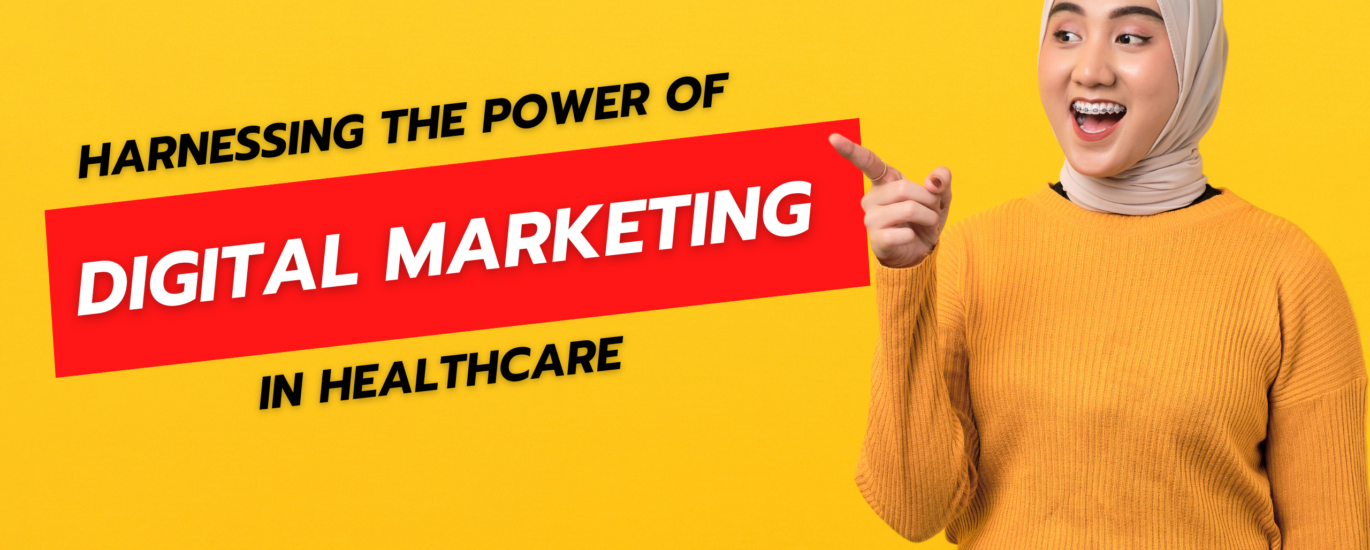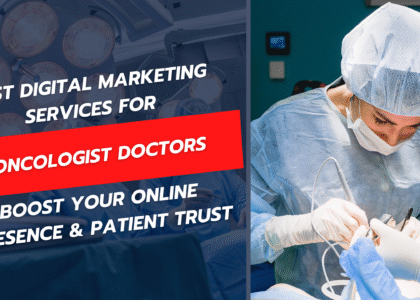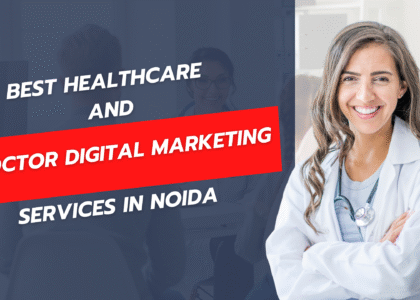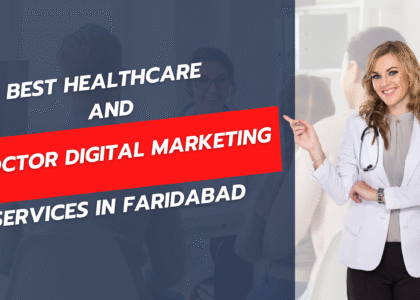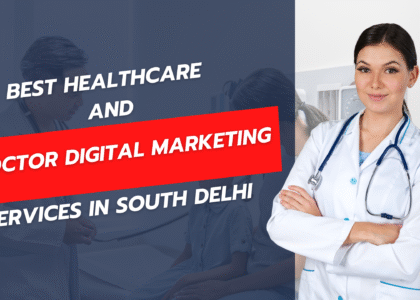In today’s rapidly evolving world, digital marketing in healthcare is becoming a game-changer for medical providers, hospitals, and healthcare organizations. With millions of patients turning to the internet to research conditions, find providers, and book appointments, the need for a strong digital presence has never been more critical. Digital marketing healthcare is not just a trend but a necessity for healthcare organizations to stay competitive, reach new patients, and build lasting relationships with their audience.
In this blog, we’ll explore how digital marketing in healthcare is revolutionizing patient care, how healthcare providers can leverage digital marketing strategies, and why it’s essential for their growth.
What is Digital Marketing in Healthcare?
Digital marketing healthcare refers to the use of online channels such as websites, social media, email campaigns, and search engine optimization (SEO) to promote healthcare services and interact with patients. The goal is to improve patient engagement, enhance visibility, and ultimately drive more patient bookings.
Through digital marketing healthcare, medical professionals can easily reach patients at various stages of their healthcare journey. From those seeking general health information to those looking for specialized treatment, digital marketing creates a bridge between providers and patients, offering access to valuable resources and healthcare information.
Why is Digital Marketing Crucial for Healthcare Providers?
- Improved Online Visibility In today’s digital age, patients typically start their healthcare journey with an online search. Whether they’re seeking a nearby clinic or researching symptoms, they will most likely turn to Google or social media platforms for guidance. A well-executed digital marketing healthcare strategy helps healthcare providers rank higher in search results, making it easier for potential patients to find them.SEO and local SEO strategies allow healthcare providers to optimize their websites and appear in the top results when people search for medical services in their area. This improved visibility significantly boosts the chances of attracting new patients.
- Engaging with Patients in Real-Time One of the unique advantages of digital marketing in healthcare is the ability to interact with patients instantly. Social media platforms, chatbots, and email communication help healthcare providers engage with patients in real-time, whether it’s answering questions or providing important updates.Patients appreciate this direct line of communication, especially when it comes to appointment reminders, post-treatment care, and follow-up messages. By responding to patient needs promptly, healthcare providers can build trust and establish long-term relationships with their patients.
- Cost-Effective Marketing Compared to traditional marketing methods such as TV, radio, or print ads, digital marketing healthcare offers a cost-effective alternative that provides measurable results. For example, pay-per-click (PPC) ads and social media advertising allow healthcare providers to target their audience more precisely, ensuring their marketing budget is spent efficiently.Digital channels like email marketing and content marketing (such as blogs and educational videos) allow healthcare organizations to consistently reach their target audience without high costs. This makes digital marketing healthcare a valuable tool for organizations of all sizes.
- Personalized Patient Experience Personalization is another benefit of digital marketing in healthcare. By leveraging data from website analytics, social media interactions, and patient feedback, healthcare providers can tailor their messaging and services to meet individual patient needs. Personalized experiences, such as tailored health tips, appointment reminders, and health content, create a stronger bond between the provider and the patient.For instance, email marketing can be customized based on patient behavior. If a patient booked a consultation for a specific health concern, sending them relevant blog posts or videos about the condition can foster deeper engagement and increase patient loyalty.
- Building Trust and Authority Trust is crucial in the healthcare industry, and digital marketing healthcare strategies can help build and reinforce that trust. Sharing educational content, patient success stories, and doctor profiles through blogs, social media, and videos can position healthcare providers as credible and trustworthy experts.Moreover, patient testimonials, reviews, and ratings on Google or healthcare review sites can significantly impact the decision-making process for new patients. Positive online reviews and a robust digital presence can drive patient conversions, creating a reliable stream of new patients.
Key Digital Marketing Strategies for Healthcare Providers
- Search Engine Optimization (SEO) One of the foundational strategies in digital marketing healthcare is SEO. Optimizing your healthcare website with targeted keywords, clear navigation, and informative content can increase your rankings on search engines. This ensures that your practice is easily discoverable when potential patients search for healthcare-related terms.Local SEO is also essential for healthcare providers. By optimizing for location-specific keywords (like “dentist near me” or “pediatrician in [city name]”), you can increase the likelihood of appearing in local search results, making it easier for patients to book an appointment with you.
- Social Media Marketing Digital marketing healthcare thrives on social media platforms like Facebook, Instagram, and Twitter. Social media allows healthcare providers to engage with patients in a more informal and direct way. By sharing useful health tips, news, and updates, healthcare organizations can strengthen their relationship with existing patients while attracting new ones.Additionally, social media provides an excellent platform for running paid ad campaigns that target specific demographics, such as people who may be interested in certain services like weight loss programs or preventive care.
- Content Marketing Content marketing is a powerful tool in digital marketing healthcare. By creating and distributing valuable, informative content such as blog posts, videos, or podcasts, healthcare providers can address common patient questions, explain medical procedures, and highlight the benefits of certain treatments or services.Educational content also helps establish authority in the healthcare field. For example, a cardiology practice might write a blog post about managing high blood pressure or create a video on heart disease prevention. Such content not only educates but also boosts SEO rankings.
- Email Marketing Email marketing is an excellent way for healthcare providers to stay in touch with their patients. Sending regular newsletters, appointment reminders, or promotional offers ensures that your practice remains top of mind. Furthermore, segmented email campaigns allow you to send personalized content that caters to specific patient needs, such as reminders for health checkups or flu shots.This level of personalized communication builds trust and improves patient retention rates, which is crucial for the long-term success of a healthcare practice.
- Paid Advertising (PPC) Paid advertising is an effective form of digital marketing healthcare that allows healthcare providers to reach potential patients quickly. By running targeted PPC ads on Google or social media platforms, healthcare organizations can attract patients who are actively searching for specific services.For example, a dental clinic can run ads targeting people searching for “best dentist in [city]” or “affordable teeth whitening.” This targeted approach ensures that the practice gets more qualified leads, resulting in higher conversion rates.
Conclusion
As patients increasingly turn to digital channels to find healthcare providers, digital marketing healthcare is becoming an essential tool for healthcare professionals. From improving online visibility and engagement to building trust and personalizing patient experiences, digital marketing healthcare strategies are crucial for healthcare organizations looking to stay ahead of the curve.
By leveraging SEO, social media marketing, content creation, email campaigns, and paid advertising, healthcare providers can strengthen their online presence, reach a broader audience, and ultimately drive patient growth. As the digital landscape continues to evolve, the future of healthcare marketing lies in innovative digital strategies that put the patient experience at the forefront.

